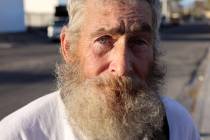Las Vegas woman in middle of brain death battle

The battle over maintaining life support for a 20-year-old Las Vegas woman continues this week in Reno. It focuses on the question of when is a person considered dead.
The unknown is whether doctors for Saint Mary’s Regional Medical Center in Reno will continue to try to pull the plug on Aden Hailu, who sought treatment for abdominal pain in April and suffered catastrophic lack of oxygen and brain damage during an exploratory surgery.
An attorney for Hailu’s family said the next step must be to develop a plan of care for Hailu.
“There is hope that she will regain consciousness,” said David O’Mara, the Reno attorney representing Fanuel Gebreyes, Hailu’s father.
The state Supreme Court ruled last week that the standards used by the hospital to make a determination of brain death might not satisfy state law. Hailu was declared brain dead at the hospital May 28 after doctors concluded that she was unresponsive, lacked brain activity as determined by reflexes and eye movement, and could not breathe on her own.
The University of Nevada, Reno student’s father has opinions from other doctors who said there was some brain activity.
Justices sent Hailu’s case back to Washoe County District Court to determine whether the American Academy of Neurology guidelines used to declare her brain dead are acceptable under the Uniform Determination of Death Act, adopted by Nevada in 1985. The law requires a determination of “irreversible cessation” of “all functions of the person’s entire brain,” including the brain stem.
A spokeswoman would not say whether hospital officials will continue to maintain that Hailu fits the definition of brain death under Nevada law.
“We are hopeful that an amicable resolution will be forthcoming,” the hospital said in a statement.
No new proceedings have been scheduled in the case.
Absence of directive
Hailu did not have advance directives, legal documents that specify the medical care people want in case they aren’t able to do so because of terminal illness, serious injury, coma or the late stages of dementia. That leaves decisions about her medical care to her father, who also is her custodian.
O’Mara said Gebreyes was overwhelmed with his daughter’s situation and did not want to speak to the news media.
“He’s spent many months dealing with lawyers and judges when he should have been dealing with doctors about the care of his daughter,” O’Mara said. “Our goal is to make sure Saint Mary’s provides the necessary care.”
After Heilu became incapacitated, doctors told her father that they wanted to perform a trachestomy, the surgical creation of an opening in the neck and the insertion of a tube to facilitate breathing and the removal of secretions.
Electroencephalograms, or EEGs, tests that trace the electric impulses of the brain, were conducted in early April and showed brain function, and O’mara wants new assessments done on Hailu.
If brain activity persists, experts say, she would not fit the American Academy of Neurology guidelines or state law.
“The court is right because the AAN guidelines were not followed,” said Dr. J. Ivan Lopez, the director of the Institute for Neurosciences at Renown Health and chairman of the Department of Neurology at the University of Nevada School of Medicine. “The patient must show no evidence whatsoever of brain function.”
Patients can show evidence of brain function, but the severity of their condition is irreversible with no reasonable hope for a meaningful recovery. Family members must decide on the plan of care unless the patient has advanced directives.
“In those cases, I can say it would be in the best interest of the patient to die,” Lopez said. “I could provide that opinion. I can say that if the patient survives, her quality of life is going to be dismal.”
Dr. Weldon “Don” Havins, a Las Vegas ophthalmologist and an attorney, said the uniform definition of death prescribes two ways a person can be declared dead: cessation of cardio-respiratory function or complete loss of brain function, including the brain stem.
Costs high
The cost to society, hospitals and caregivers to keep a person on life support is high. Patients must be in an intensive care unit, which can cost thousands of dollars per day depending on the patient’s condition. Nurses and doctors must maintain care around the clock, preventing bed sores and other conditions that come from being immobilized for days, months or even years.
Texas has a futility law that allows the discontinuation of life-sustaining treatment 10 days after giving written notice in cases considered futile by the treating medical team.
“There’s a committee of physicians and ethicists who determine if further treatment is futile,” said Havins, who also teaches medical ethics at the Touro University Nevada College of Osteopathic Medicine in Southern Nevada. “If they make that declaration, the family has 10 days in which to find another facility that will accept the transfer of the patient.”
O’Mara, the attorney for Hailu’s family, said medical interventions have been recommended, including a tracheostomy, nutrition and thyroid medication. The family wants those options explored.
O’Mara said he hopes to meet with representatives for Saint Mary’s soon.
“Right now, things are a little up in the air,” O’Mara said of the court case. “The parties probably will get together in the next couple of days to determine what we should do.”
Contact Steven Moore at smoore@reviewjournal.com or 702-380-4563.


















